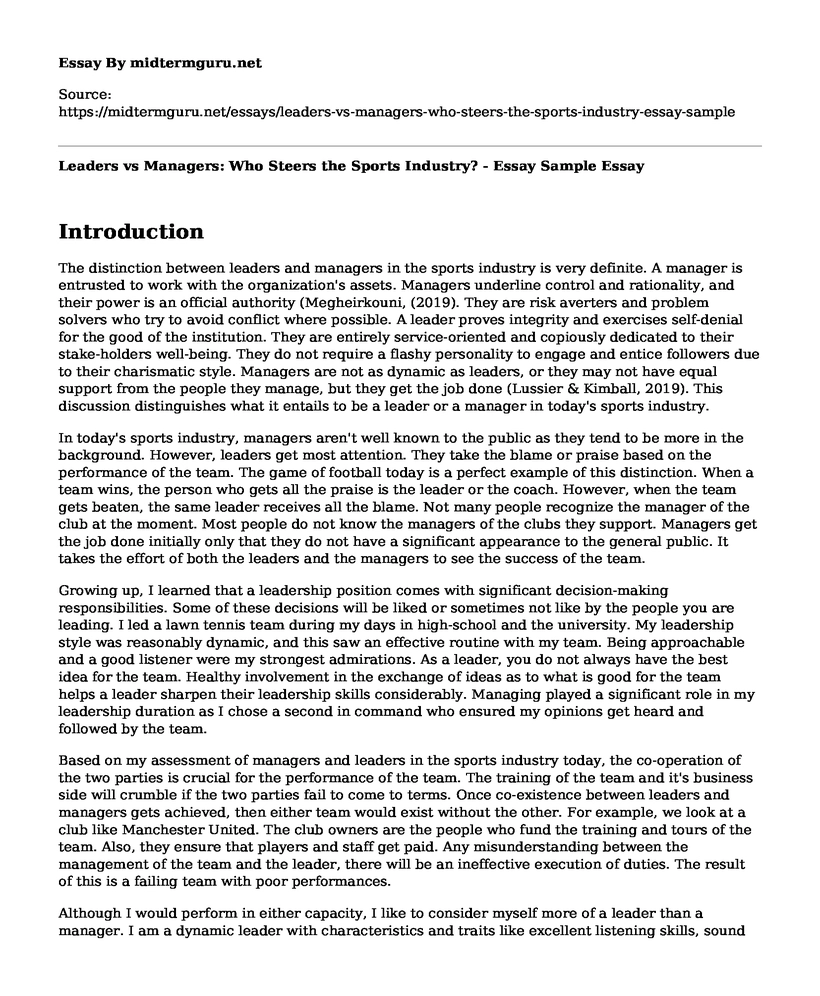Introduction
The distinction between leaders and managers in the sports industry is very definite. A manager is entrusted to work with the organization's assets. Managers underline control and rationality, and their power is an official authority (Megheirkouni, (2019). They are risk averters and problem solvers who try to avoid conflict where possible. A leader proves integrity and exercises self-denial for the good of the institution. They are entirely service-oriented and copiously dedicated to their stake-holders well-being. They do not require a flashy personality to engage and entice followers due to their charismatic style. Managers are not as dynamic as leaders, or they may not have equal support from the people they manage, but they get the job done (Lussier & Kimball, 2019). This discussion distinguishes what it entails to be a leader or a manager in today's sports industry.
In today's sports industry, managers aren't well known to the public as they tend to be more in the background. However, leaders get most attention. They take the blame or praise based on the performance of the team. The game of football today is a perfect example of this distinction. When a team wins, the person who gets all the praise is the leader or the coach. However, when the team gets beaten, the same leader receives all the blame. Not many people recognize the manager of the club at the moment. Most people do not know the managers of the clubs they support. Managers get the job done initially only that they do not have a significant appearance to the general public. It takes the effort of both the leaders and the managers to see the success of the team.
Growing up, I learned that a leadership position comes with significant decision-making responsibilities. Some of these decisions will be liked or sometimes not like by the people you are leading. I led a lawn tennis team during my days in high-school and the university. My leadership style was reasonably dynamic, and this saw an effective routine with my team. Being approachable and a good listener were my strongest admirations. As a leader, you do not always have the best idea for the team. Healthy involvement in the exchange of ideas as to what is good for the team helps a leader sharpen their leadership skills considerably. Managing played a significant role in my leadership duration as I chose a second in command who ensured my opinions get heard and followed by the team.
Based on my assessment of managers and leaders in the sports industry today, the co-operation of the two parties is crucial for the performance of the team. The training of the team and it's business side will crumble if the two parties fail to come to terms. Once co-existence between leaders and managers gets achieved, then either team would exist without the other. For example, we look at a club like Manchester United. The club owners are the people who fund the training and tours of the team. Also, they ensure that players and staff get paid. Any misunderstanding between the management of the team and the leader, there will be an ineffective execution of duties. The result of this is a failing team with poor performances.
Although I would perform in either capacity, I like to consider myself more of a leader than a manager. I am a dynamic leader with characteristics and traits like excellent listening skills, sound decision-making attributes. As a leader, I know that I do not always have the best idea. Giving room for team members to put in their opinions makes the availability of many options to choose. For me, the most effective leader in sports today is Liverpool FC's leader Jurgen Klopp. He led his team to victory in the 2018-2019 UEFA Champions League. It comprises the best football clubs from across the world. Besides, Liverpool FC is one of the best performing teams in the England Premier League. He attributes leadership to having influential people with better knowledge in various departments than himself around him (Kerr & Prentice, 2019). He doesn't act like he knows it all. He is always ready to admit when he is clueless, then takes his time to get some clues. It is not philosophy but his way of leadership.
Conclusion
Conclusively, as a leader, I believe that any person aspiring to lead in any field should try to model themselves afterward. We have discussed the various factors under leadership vs management above. However, the two parties rely on one another for the achievement of better success. The managers must relate well with the leaders to ensure no party lags in delegating their duties. A good understanding between the two parties ensures that the team is motivated and indulged. Otherwise, any organization with misunderstandings between its leaders and managers is doomed to underperform or crumble.
References
Kerr, J., & Prentice, D. (2019). The stunning leadership depth Liverpool have created under Klopp. Retrieved 10 September 2019, from https://www.liverpoolecho.co.uk/sport/football/football-news/stunning-leadership-depth-liverpool-created-15454099
Lussier, R. N., & Kimball, D. C. (2019). Applied sport management skills. Human Kinetics.
Megheirkouni, M. (2019). Power bases and job satisfaction in sports organizations. Journal of Global Sport Management, 4(3), 271-290.
Cite this page
Leaders vs Managers: Who Steers the Sports Industry? - Essay Sample. (2023, Feb 09). Retrieved from https://midtermguru.com/essays/leaders-vs-managers-who-steers-the-sports-industry-essay-sample
If you are the original author of this essay and no longer wish to have it published on the midtermguru.com website, please click below to request its removal:
- Essay on Management Example: Managing Organizational Change as a Method of Planning
- Phenomenological Study in Leadership - Paper Example
- The Safety of Aircraft Windows - Paper Example
- Essay Sample on Fire Fighters: Line of Duty Death
- Cost & Risk Management: Keys to Project Success - Essay Sample
- Good Decision Making: Impacting People Positively - Research Paper
- Leadership Defined: Science or Art? - Essay Sample







